The WFP Executive Board concluded its 2024 first regular session on Wednesday 28 February. Over the three-day session, Members of the Board approved 11 documents including seven Country Strategic Plans and one Interim Country Strategic Plan.
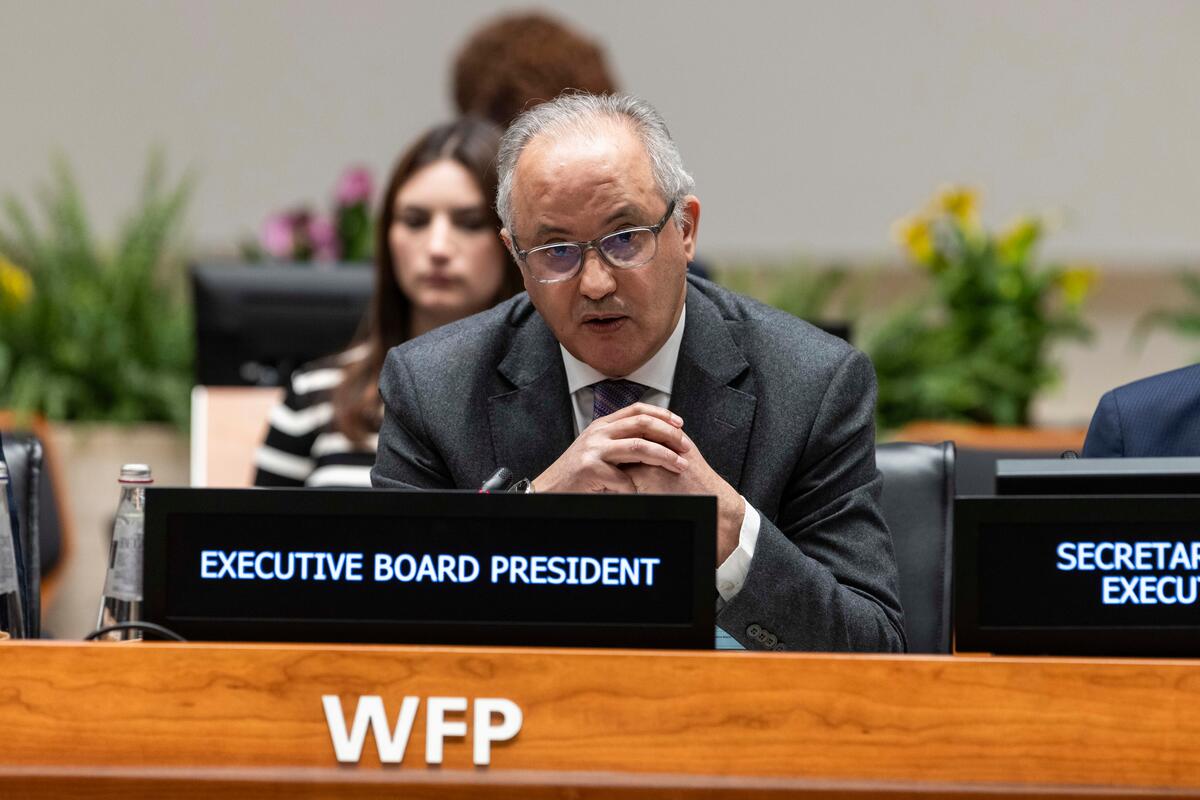
Election of the Bureau
The session began with the election of the 2024 Board Bureau, including H.E. Mr. Youssef Balla, Ambassador and Permanent Representative of Morocco, as the new Board President.
Opening remarks by the Executive Director
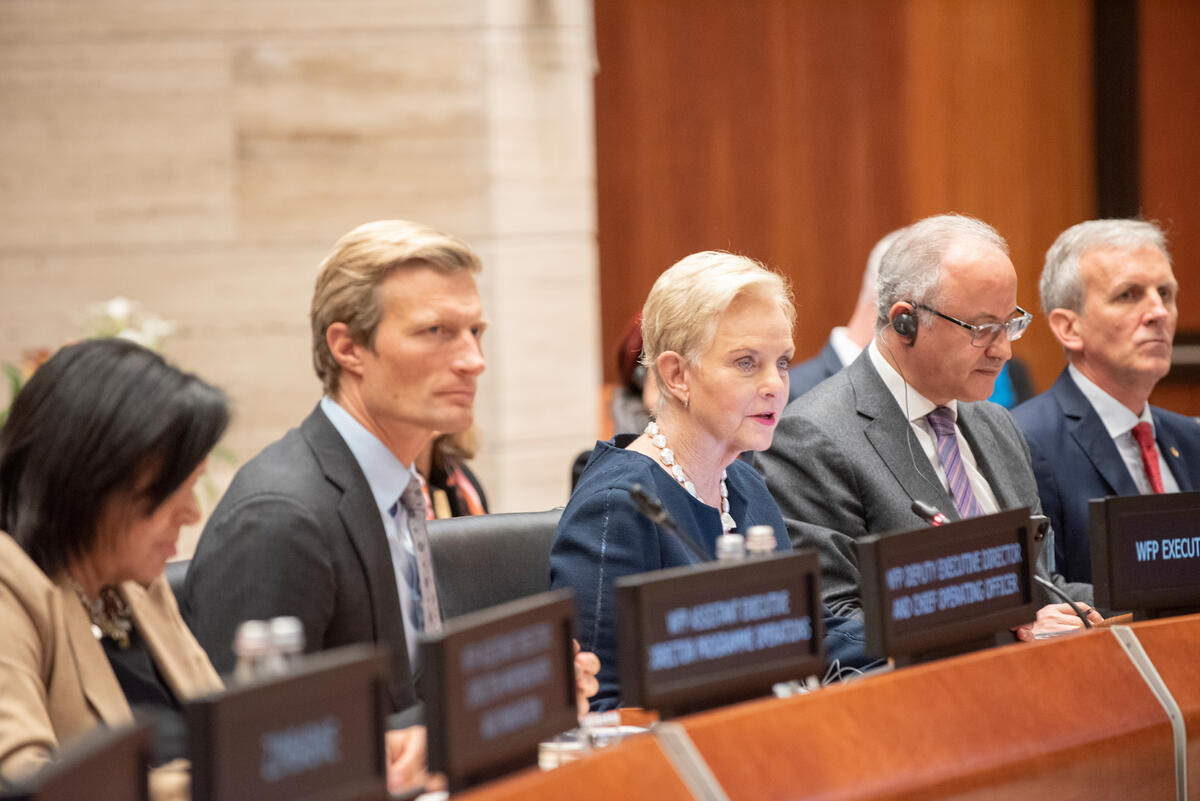
In her opening statement, the Executive Director, Cindy McCain, reported on WFP’s implementation of its ambitious agenda for change to continue delivering on its mission while navigating the funding challenges the entire humanitarian sector is facing.
McCain also said that WFP’s new headquarters organizational structure came into effect the previous week. This new configuration is intended to strengthen coordination and collaboration across teams by streamlining bureaucracy, boosting agility, and providing a more strategic and focused support for the frontlines.
The Executive Director anticipated that a subsequent regional organizational review would ensue with the goal of identifying duplications and overlaps in functions, and refining roles, responsibilities and accountabilities between WFP headquarters and the regional bureaux in relation to country operations.
She then reiterated that WFP is facing post-COVID levels of hunger but with pre-COVID levels of funding: while WFP aims to achieve US$ 10 billion in contributions for 2024, the forecasted funding is of US$ 8 billion. This is why the prioritisation exercise through which country offices are revising their 2024 plans is crucial to ensure that immediate needs are met with the available resources. The Executive Director mentioned that WFP is also undertaking a re-budgeting exercise based on prudent assumptions in line with funding forecasts to ensure that the organisation has a realistic and achievable budget plan for 2024 while maximizing resources to deliver the priorities outlined on the Management Plan for 2024.
In her remarks the ED also provided an overview of some of the most devastating humanitarian crises. She reported on the emergency in Gaza where the entire civilian population requires food assistance, and half a million people are at serious risk of famine, especially in the north. Here WFP has been forced to temporarily pause food distributions due to the breakdown in civil order and the inability to ensure the safety of the local population. McCain called for immediate action and said that the opening of the port of Ashdod and the Karni crossing are necessary to increase the volume of supplies going into northern Gaza as well as a working humanitarian notification system and a stable communications network to keep humanitarian staff safe.
Among the neglected crises, the ED expressed concern for the Democratic Republic of Congo (DRC) where a surge in violence in the eastern provinces has caused massive displacement. Despite the fact that 5.4 million people are acutely hungry and over 6 million are internally displaced people (IDPs), WFP can assist only 1.5 million beneficiaries because of severe funding shortfalls.
Cindy McCain gave some figures about the conflict in Sudan whose impact is spilling over the neighbouring countries, especially in South Sudan and Chad. In Sudan “WFP is able to reach just one in ten of the people who need food assistance – in a country where over 18 million are acutely hungry. […] Political solutions are urgently needed to carve out humanitarian access, set up cross-border supply routes and – above all – end the violence that is fuelling this hunger crisis.” said the ED. Discussion on the Sudan crisis continued in a dedicated high-level special event on Wednesday. See below for more details.
The Executive Director then briefly updated the Board on the dramatic situations in Haiti, Myanmar and Ukraine as examples of escalating humanitarian crises.
In Haiti, following a dramatic intensification of violence and protests, over 4.3 million people are facing acute food insecurity, and the number of displaced people has spiked to over 300,000. The ED explained that here WFP could reach only 2 million people last year and this number will probably be reduced in 2024, unless there is a significant increase in funds.
In Myanmar there are 2.5 million people at greatest risk of starvation. Since October 2023, because of growing levels of conflict, WFP staff was relocated from towns burdened by intense fighting and over 200,000 people were cut off from humanitarian assistance.
In Ukraine, WFP aims to assist 2.4 million people in affected regions near the frontline where instability has increased in the winter months. “We are also working with FAO to support farmers running mine action initiatives to clear agricultural land, and providing key agricultural supplies to support food production,” said McCain.
The Executive Director then updated the Board on the latest WFP initiatives on technology and innovation to transform the lives of vulnerable communities and announced the upcoming launch of the WFP’s new Global Data Strategy as a further step on the innovation journey as to complement the Information and Technology Strategy 2023-2026.
Cindy McCain also commended the research undertaken by the WFP’s Innovation Accelerator in Munich in collaboration with such partners as the German Aerospace Centre and the CERN laboratory in Geneva. Among the cutting-edge technologies, the ED mentioned plugPAY, a digital payment platform transferring cash payments to beneficiaries’ bank accounts or mobile wallets. “Already being used by our teams in Sri Lanka and Zambia, we are rolling it out to five more countries in the months ahead and mapping the feasibility of expanding plugPAY across WFP’s operations,” said McCain.
The ED also revealed the new ambitious approach that WFP is developing to expand strategic partnerships and unlock new opportunities in the private sector, including across the global south.
Finally, Cindy McCain made an appeal to government representatives for support. “I ask each one of you to be the change you want to see in the world. I know that, like me, you want to see an end to global hunger. Now, more than ever, WFP needs your partnership and support to achieve this,” concluded the ED.
Key decisions and discussion points
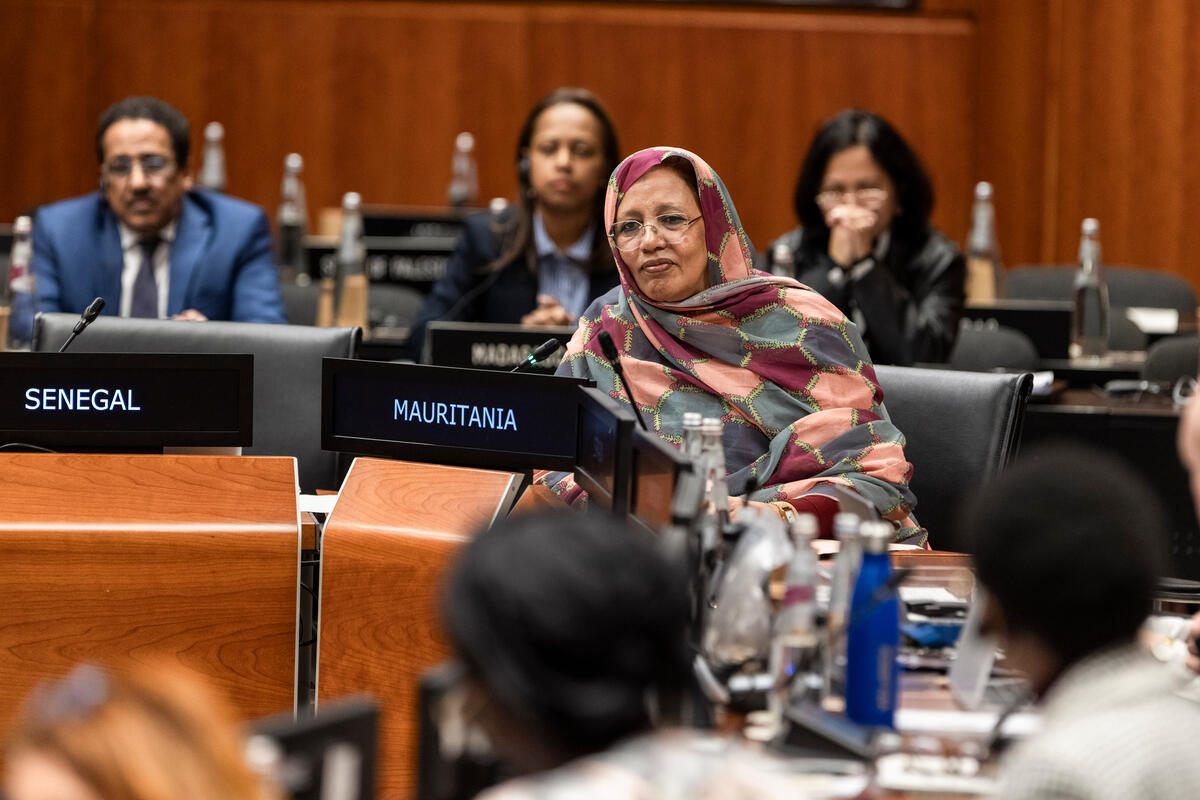
Operational matters and evaluation reports
The Board examined and approved country strategic plans (CSPs) for Bhutan, Burundi, Chad, The Gambia, Madagascar, Mauritania, Philippines and an interim CSP for the Republic of Moldova. In addition, three evaluations for the previous CSPs for Bhutan (2019‒2023), Madagascar (2018-2023) and Philippines (2018-2023) along with the respective management responses were considered.
Implementation of the Doha Programme of Action for the least developed countries
The Board also discussed WFP’s engagement in the Implementation of the Doha Programme of Action for the least developed countries (DPoA). Adopted on March 2022, this programme introduces a new generation of strengthened development commitments grounded in the principle of leaving no one behind and reaffirms the need to scale up global support to the least developed countries. The Board noted the strong alignment of WFP’s strategic plan for 2022–2025 with DPoA’s six key focus areas for action and stressed the need for WFP to direct special attention to its implementation and further integrate it into WFP activities, especially through its country strategic plans.
Update on the organization structural review and the 2024 budget
The Board was given an oral update on the organization structural review and the 2024 budget. WFP presented the EB members its new organigram along with the new divisional configuration enhancing coordination and collaboration across HQ departments and divisions and increasing the operational agility and response times on the ground.
Oral update on the governance review
The Chair of the Governance Review Working Group, Tomás Alberto Duncan Jurado, Permanent Representative of Panama, provided an update on the programme of work and critical landmarks for this initiative that aims to enhance governance efficiency and effectiveness. The Board members were informed that the working group gathered three times since its establishment in 2023 and is finalising a roadmap to review the 14 recommendations from the report of the independent consultant. Among the recommendations that have already an implementation plan, Jurado mentioned redesigning the induction session for new Board members, digital transformation of relevant Board processes and reinforcing word limits for documentation.
Click here to review session’s documents and supplementary information. Consult here the decisions and recommendations.
Side events and exhibits
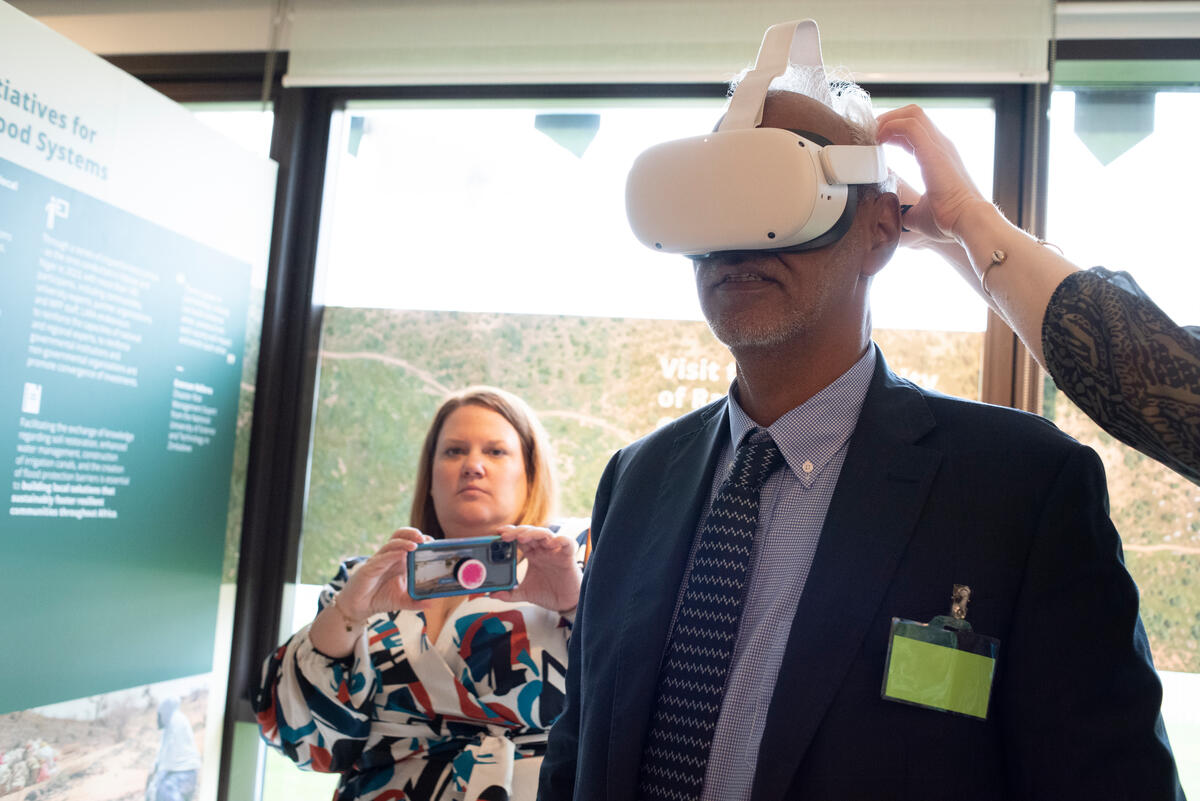
On Tuesday the exhibit “A green wall against hunger: Partnerships for resilience building to decrease humanitarian needs” was launched. Sponsored by the German Federal Ministry for Economic Cooperation and Development, the multimedia exhibition showcased the Sahel Integrated Resilience Programme and WFP's resilience-building initiatives in this area.
In a region where most people rely on farming and herding to make a living, recurrent climate extremes lead to land degradation and desertification and impact the livelihoods of millions. These factors, coupled with rapid population growth, political unrest and conflict, contribute to rising food insecurity, malnutrition, and displacement. The WFP’s approach combines land rehabilitation and livelihood activities to support to smallholder farmers with school feeding, nutrition interventions and institutional capacity strengthening. Among the other initiatives, the intervention includes the use of anticipatory action systems and early warning information.
The exhibit was also an opportunity to present the next phase of the initiative and reflect on the need for longer-term programmes embedded in national policies. Speakers also highlighted the role of strategic partnership with national governments and regional organisations like the African Union and the Economic Community of West African States. These play a key role in supporting agricultural sectors, humanitarian actions, and food systems through analysis, technical assistance, and resource mobilisation.
The event was moderated by Mr. Martin Frick, Head of WFP Berlin Office and included remarks by Cindy McCain, WFP’s Executive Director, Ms. Elke Löbel, Commissioner for Refugee Policy and Director for displacement and migration, crisis prevention, and management at the German Federal Ministry for Economic Cooperation and Development, H.E. Ms. Sainta Ndem Ngoidi, Secretary of State in the Ministry of Economy, Development Planning and International Cooperation of the Republic of Chad and Ms. Andrea Meza Murillo, Deputy Executive Secretary of the United Nations Convention to Combat Desertification.

A side event entitled “WFP in Small Island Developing States: Perspectives from the Caribbean and the Pacific” took on Tuesday.
Ms. Lola Castro, WFP Regional Director for Latin America and the Caribbean, introduced the challenges faced by the small island developing states (SIDS) in this region.
Due to their small size, remoteness and exposure to environmental threats and external economic shocks these countries need to address specific vulnerabilities in the context of climate change and its impact on food security and nutrition.
Ms. Valerie Guarnieri, WFP Assistant Executive Director of Programme Operations moderated a discussion with a panel composed by H.E. Mr. Joachim Henry, Minister of Equity, Social Justice and Empowerment of Saint Lucia, H.E. Mr. Anare Leweniqila, Counsellor and Deputy Permanent Representative of Fiji to UN Organizations, and H.E. Ms. Mirta Granda Averhoff, Ambassador and Permanent Representative of Cuba.
The side event was followed by an exhibition on SIDS in the presence of the WFP’s Executive Director Cindy McCain.
On Wednesday afternoon WFP commemorated the 9th African Day of School Feeding through the event “Africa Day of School Feeding: Enhancing Education and Human Capital in Africa”.
The Executive Director Ms. Cindy McCain delivered her opening remarks and Ms. Valerie Guarnieri, WFP’s Assistant Executive Director of the Programme Operations Department moderated a round table on the implementation of school meal programmes in African countries and their role to drive education outcomes and build human capital.
Among the panellists, Ms. Carmen Burbano, WFP Director of School Feeding, H.E. Ms. Claudiana A. Cole, Minister of Basic and Secondary Education of the Government of The Gambia, H.E. Ms. Sainta Ndem Ngoidi, Secretary of State in the Ministry of Economy, Planning and International Cooperation of the Government of Chad, Ms. Fanja Raharinomena, Secretary General in the Ministry of Agriculture and Livestock of the Government of Madagascar, H.E. Mr. Haladou Salha, Senior African Union/NEPAD Technical Advisor to the Group of Rome-based African Ambassadors, Ms. Gerardine Mukeshimana, IFAD’s Vice-President and Ms. Lynnette Neufeld, Director of FAO’s Food and Nutrition Division.
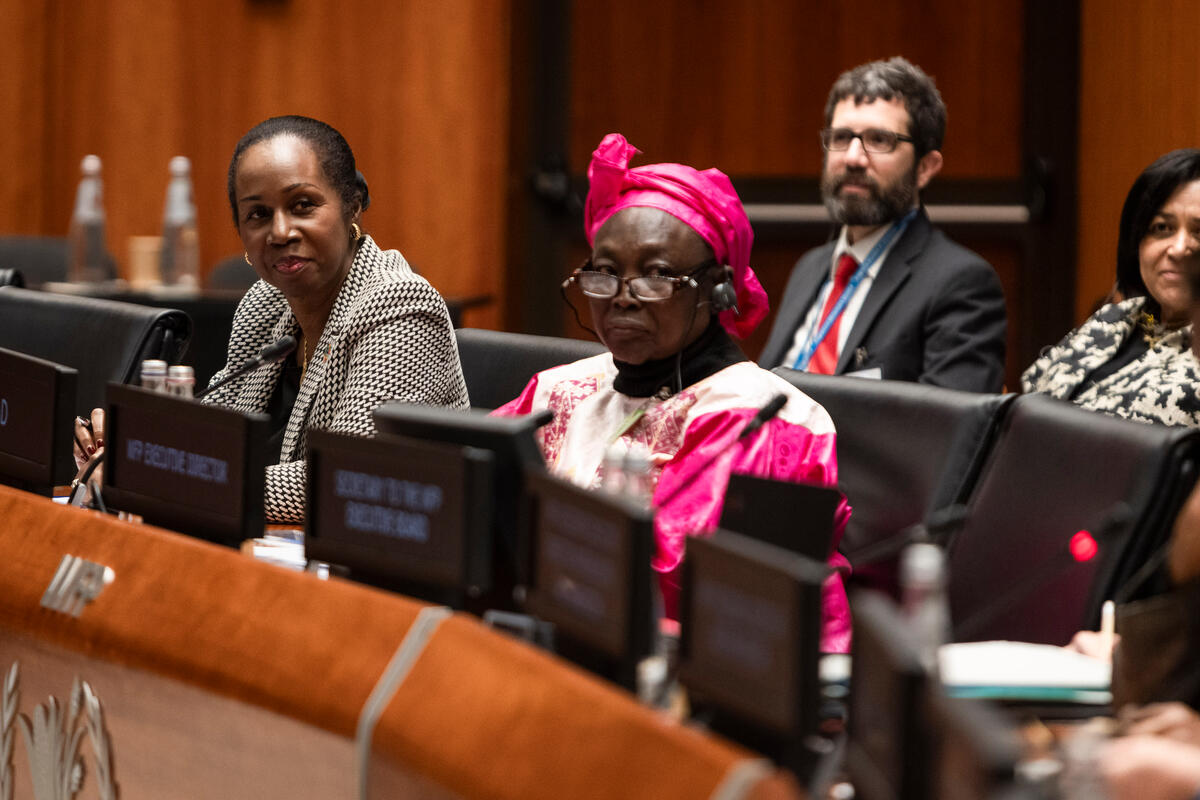
High-level special event “Sudan cross-regional update: strategic insights into WFP’s humanitarian operations”
After the closure of the EB formal session, on Wednesday afternoon the WFP hosted a high-level special event on the regional implications of the rapidly worsening humanitarian emergency in the Sudan.
Ms. Rania Dagash-Kamara, WFP’s Assistant Executive Director of the Partnerships and Innovation Department, moderated a high-level panel discussion on the deepening hunger crisis in the Sudan and the impact on its neighbouring countries, particularly Chad and South Sudan. Then the floor was opened to the government representatives for questions and remarks.
Cindy McCain, WFP’s Executive Director, intervened and called on donors to increase their support to prevent wider regional destabilisation. Since the start of the conflict in October and despite the lack of access and resources, WFP has assisted around 7 million people. However, “currently WFP can reach just one in ten people in need, in a country where 18 million people are acutely hungry”, said the ED.
Among the high-level speakers, Ms. Clementine Nkweta-Salami, Deputy Special Representative of the Secretary-General (SRSG) and Resident and Humanitarian Coordinator in the Republic of the Sudan, offered her valuable insight into Sudan’s crisis. The UN SRSG highlighted that this is “a protection crisis” with more than 13,000 reported fatalities and over 33,000 injuries across the country.
According to the UN figures, 25 million people, more than half of Sudan’s population, need humanitarian assistance. “Conflict-related displacement is at the highest ever recorded levels with more than 8 million people internally displaced, about 15 percent of the total population. Nearly 2 million have sought refuge in neighbouring countries making Sudan the largest and fastest displacement crisis in the world”, said Nkweta-Salami, stressing that unlike other countries with internal displacement, Sudanese IDPs are seldom found in camps or in formal settlements, while the majority reside in host communities. “I call them the invisible population”, emphasised the Sudan’s Resident and Humanitarian Coordinator.
Clementine Nkweta-Salami then provided a picture of a country in appalling conditions. The UN SRSG reported limited access to essential services, such as healthcare and telecommunications facilities, an increased number of conflict-related sexual and gender-based violence incidence, an alarming level of severe acute malnutrition in children along with education disruption.
As per the resourcing situation, the UN SRSG explained that response is funded through the Sudan Humanitarian Fund managed by OCHA. She added that the 2024 humanitarian response plan targets 14.7 million most vulnerable people with a total requirement of US$ 2.7 billion, but so far only the 3.6 percent is funded. For this reason, Nkweta-Salami appealed for more resources and support to assist Sudanese refugees and concluded her intervention by commending WFP’s leadership “for not only providing life-saving assistance to the most vulnerable people but also for providing extensive support to the broader humanitarian response in Sudan through its leadership of common services, including the management of the UN humanitarian air service, leading the logistics cluster as well as the emergency telecommunications cluster”.
H.E. Ms. Sainta Ndem Ngoidi, Secretary of State in the Ministry of Economy, Development Planning and International Cooperation of the Republic of Chad, contributed to the discussion by offering the perspective of a hosting country. Chad has received over 500,000 people since the start of the crisis in addition to 600,000 pre-existing refugees from Darfur.
H.E. Ndem Ngoidi explained that massive displacement is creating enormous pressure on a country which was already struggling with multiple stressors: e.g. climate-fuelled food insecurity and armed groups’ violence perpetrated in the Lake Chad Basin, fragility of the security situation in neighbouring countries. Moreover, the Sudan crisis is creating growing tension between host communities and arrivals over scarce resources and land availability for agriculture purposes.
The Secretary of State in the Ministry of Economy, Development Planning and International Cooperation said that the government of Chad is committed to the peaceful resolution of the crisis and has taken significant measures to secure its border with Sudan and opening a humanitarian corridor to allow Sudanese people to come into the country. H.E. Ndem Ngoidi added that the Chadian government has also mobilised resources and coordinated administrative and provincial authorities to facilitate access for humanitarian actors to Chad. Finally, she called for the international community, governments and private sector partners to activate long-term programmes for response and resilience.
Mr. Murithi Mutiga, Director for Africa at the International Crisis Group (ICG), joined the discussion online. He elaborated on the spillover effect to other states in the region, such as South Sudan and Chad.
Mr. Mamadou Dian Balde, UNHCR Regional Director for East and Horn of Africa, and Great Lakes, also intervened in this exchange stating that “even though this is one of the most rapid force displacement situations and one of the most important protection crises we have witnessed in the past few years, we have not seen enough attention by the international community, not only to address it but also to support the people who have been affected”.
The UNHCR Regional Director then informed that the regional refugee response plan is of 1.4 billion to reach 2.7 million people but advised that more and better assistance is needed and stressed the need for peace and ceasefire.
In his remarks, Mr. Michael Dunford, WFP Regional Director for Eastern Africa and Corporate Response Director for the Sudan regional crisis, apprised that WFP is operating and supporting in all the neighbouring countries. Dunford stressed the need to end this war through political engagement and alerted: “Unless we have an end to the conflict, the risk of a catastrophe is very real. And unless we see a solution in the very near future, not only would Sudan be impacted, but the rest of the region”.
























































































